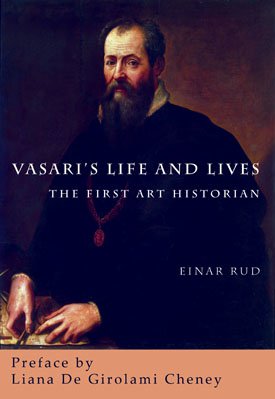
About the Author
Liana De Girolami Cheney, Professor of Art History, Chairperson of the Department of Cultural Studies at the University of Massachusetts Lowell, is author and coauthor of numerous books and articles, including, Botticelli’s Neoplatonic Images; Neoplatonism and The Arts; The Paintings of the Casa Vasari; Readings in Italian Mannerism; The Symbolism of Vanitas in the Arts; Self-Portraits of Women Painters; Essays of Women Artists: ‘The Most Excellent’: Andrea del Verrocchio’s Celebration: 1435-1488; Medievalism and Pre-Raphaelitism; Neaplatonic Aesthetics in Literature, Music and the Visual Arts; Giorgio Vasari’s Teachers: Sacred and Profane Art: Giuseppe Arcimboldo; The Religious Architecture of Lowell; The Homes of Giorgio Vasari (Ledimore di Giorgio Vasari); Girogio Vasari’s Prefaces: Art and Theory. Presently, she is completing two books, “Girogio Vasari’s Artistic and Emblematic Manifestations” and “Giorgio Vasari: pennell, pluma e ardore,” with Joanna Wolanska and Joseph Grabski, eds. in Artibus et Historiae, Special Edition.
VASARI’S LIFE AND LIVES: The First Art Historian
Einar Rud, with a preface by Liana De Girolami CheneyNew Academia Publishing, 2011
190 Pages, 76 Illustrations
ISBN 978-0-9832451-6-2 Paperback
For BULK ORDERS, order directly from New Academia Publishing.
Queries: orders@newacademia.com
About the Author
Liana De Girolami Cheney, Professor of Art History, Chairperson of the Department of Cultural Studies at the University of Massachusetts Lowell, is author and coauthor of numerous books and articles, including, Botticelli’s Neoplatonic Images; Neoplatonism and The Arts; The Paintings of the Casa Vasari; Readings in Italian Mannerism; The Symbolism of Vanitas in the Arts; Self-Portraits of Women Painters; Essays of Women Artists: ‘The Most Excellent’: Andrea del Verrocchio’s Celebration: 1435-1488; Medievalism and Pre-Raphaelitism; Neaplatonic Aesthetics in Literature, Music and the Visual Arts; Giorgio Vasari’s Teachers: Sacred and Profane Art: Giuseppe Arcimboldo; The Religious Architecture of Lowell; The Homes of Giorgio Vasari (Ledimore di Giorgio Vasari); Girogio Vasari’s Prefaces: Art and Theory. Presently, she is completing two books, “Girogio Vasari’s Artistic and Emblematic Manifestations” and “Giorgio Vasari: pennell, pluma e ardore,” with Joanna Wolanska and Joseph Grabski, eds. in Artibus et Historiae, Special Edition.
About the book
In celebration of Giorgio Vasari (1511-1574) 500th anniversary of his birth, it is appropriate to honor modern scholars, in particular, Einar Rud (1892 – c.1980), who was the first to view Vasari as an art historian and writer. Vasari’s intellectual curiosity, enthusiasm and artistic ability made it possible for him to put forth a new perspective on art. This art expresses a concern for success, a fascination for the antique, and a delight for virtuosity depicted in his religious and secular paintings, and is also revealed in his writings. Vasari’s humanistic role combines the examination of artistic pursuit and practical undertakings with intellectual and cultural endeaors, thus establishing the path of the art historian.





 Coming Soon
Coming Soon Awards
Awards